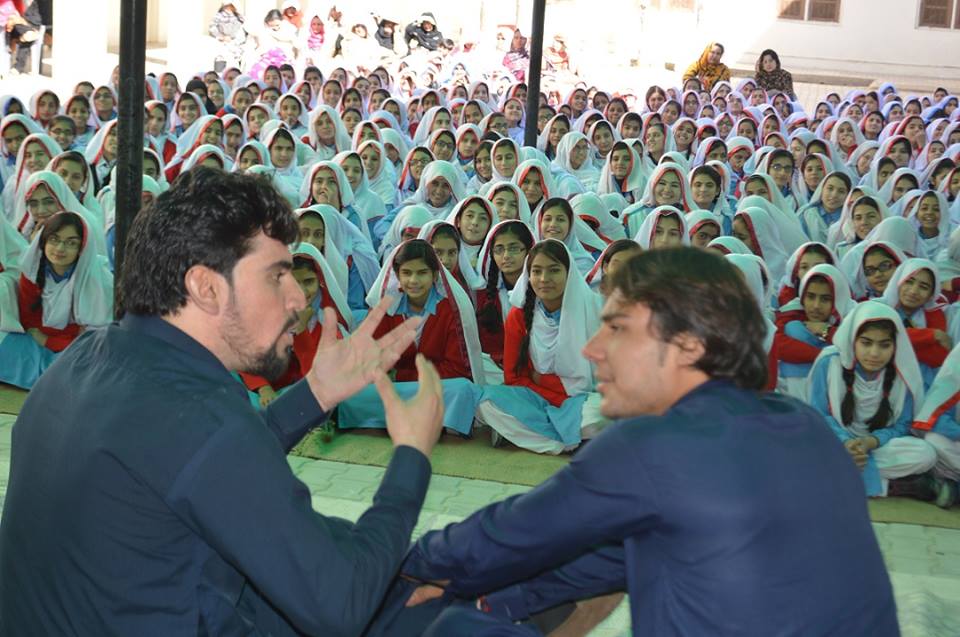
Pakistan: Promoting tolerance through the arts – Minority-driven theatre and storytelling for youth
Duration: October 2016 – February 2020
Location: Pakistan (with a focus on Quetta, Baluchistan)
Minorities: Hazara Shi’a, Hindus, Christians
What was this programme about?
This programme used arts to inform and increase engagement of young people in Pakistan in public discourse about tolerance towards minorities, and respect for diversity. Local actor-activists used storytelling and theatre to lead performances and discussions in schools, and young people were supported to create their own creative outputs exploring these themes. Showcases of the young people’s work facilitated advocacy with local, regional and national authorities to promote effective, responsive and accountable governance to protect minorities in Pakistan.
Why did we deliver this programme?
Ethnic and religious minorities in Pakistan face increasing levels of discrimination and this is consistently reflected in the educational system. The use on non-inclusive curricula promotes a representation of Pakistani identity that leaves little space for creating a constructive dialogue based on tolerance and diversity. While curricula are formulaic in their orientation and educational approaches tend to emphasise memorisation, storytelling was identified as a new and powerful way to raise awareness on minority rights through the direct engagement of young activists, teachers and students.
While storytelling itself has a long history in what is modern day Pakistan, the programme employed a new, inclusive devising process to create drama productions based on the students’ own experiences. Minority rights activists used these creative strategies to fight prejudice and engage young people directly in the debate.
Through the training provided by the implementing partner, local minority rights activists learnt to use storytelling and drama techniques and applied their skills to their work with young people in the schools targeted in Quetta. Students have been encouraged to share their perspectives and convey messages of tolerance, understanding and peace while participating at the development of the drama productions. The engagement of teachers in the creative process helped them address diversity issues, teach minority rights, and use storytelling-based education to tackle sensitive societal issues with students. Particular attention was given to promoting gender equality both among the actor-activists, the students and teachers involved in order to address specific issues faced by minority women in Pakistan.
The impact of the project extended to the wider society who attended the performances and to decision makers through advocacy events. Common objective of these events was to share the experience and good practices from the programme and to stimulate discussion on the role of arts, and specifically drama/storytelling as instruments to build tolerance and respect for cultural diversity among Pakistani youth.
Due to the impact of the Covid-19 pandemic on the programme activities, we took the difficult decision to cancel the final evaluation of the project – due to take place in April 2020 – as we did not feel this could be meaningfully completed.
What did we do?
- Minority rights and storytelling/theatre workshop for activists in Quetta.
- Conducting a mentoring programme by experienced minority activists and street theatre professionals, including from MRG’s Drama, Diversity and Development.
- Training local teachers on facilitating young people to use storytelling techniques in relation with minority rights.
- Establishing ‘Bards of Peace’ clubs in selected schools in Quetta where students learn about minority rights and develop skills to discuss minority issues via creative expressions.
- Developing original storytelling and theatre productions to be performed in local schools.
- Holding ‘Stories of Peace’ festivals presenting young peoples’ work to the general public.
- Conducting advocacy meetings with local, regional and national authorities to improve governance for protection of minorities in Pakistan.
What did we achieve?
- 67 actor activists were trained during one training in Islamabad (12 participants, 50% women) and one in Quetta (55 participants, 31% women), with representation from a diverse range of religious, ethnic, and linguistic identities.
- 102 teachers from 6 public and private schools were trained on storytelling techniques and minority rights. The majority of teachers trained were women who represented a range of different ethnic, religious, and linguistic groups.
- 181 students became members of the 6 ‘Bard of Peace Clubs’ – one in each targeted school. The clubs reached up to 75% of women participants, while 30% of members were representatives from minority groups. More than 95%, club members were retained over time and successfully engaged in “Bards of Peace Clubs” meetings and other project activities.
- 3 ‘Stories of Peace’ Festivals were organised with the participation of 1806 students and 166 between teachers, parents and community members through 18 theatre performances.
- 7 district advocacy meetings in Baluchistan were held with the participation of 27 high profile and 31 medium profile decision makers, including district administrators, tribal leaders, representatives of the Baluchistan Human Rights Department, political parties’ representatives, members of the Baluchistan Provincial Assembly and the advisor to the Chief Minister for Minorities Affairs.
Who delivered the programme with us?
 Strengthening Rights and Equality by Empowering Teams (STREET)
Strengthening Rights and Equality by Empowering Teams (STREET)
STREET is a group of professional psychologists, anthropologists, researchers, community mobilisers, social workers, teachers, doctors, volunteers and supporters. STREET is also an expert in interactive theatre training & performances. STREET is based in Quetta, Pakistan.